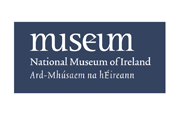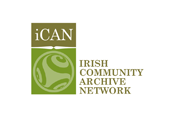Shops of the 30s and 40’s
Oughterard in the 30s and 40s was like most other small Irish towns, the same families had been in most of the shops for several generations and had built up and passed on a deep understanding and knowledge of their customers. The business families of this town were the Keoghs, Sullivans, Fergusons, Powers, Monahans and Joyces. They were not just shopkeepers, they were the friends of the people. When money was scarce they gave their customers support by giving them credit until money arrived from selling their animals and produce or perhaps the dollars and pounds were sent home. Each customer had a notebook into which they wrote their messages, and these were handed to the shopkeeper with the shopping bags. The order was filled and the prices were written into each notebook, and once a week or twice a month, whichever the arrangement was, the shopkeeper added up the list and the bill was paid.
John Henry Joyce
In 1840 John Henry Joyce (grandfather of Dermot Joyce, Ardvarna) opened Joyce’s Shop in Corribdale, Main St.Oughterard. The shop sold groceries, hardware, animal feed and farm implements. They held a license to sell alcohol and later on they sold fishing tackle, jackets and sweaters. They also had a license to store guns and to sell guns.
Sale of Goods
Goods were sold from behind a mahogany counter. (This counter was later sold to Tim Molloy who set up shop opposite Joyces.) Goods like tea, flour, sugar, bread soda, washing soda, caraway seeds, raisins, sultanas, currants, flakemeal, pinhead oats were all weighed and put into stiff brown paper bags. Goods were delivered in large jute sacks and heavy timber boxes and were measured out into weights suitable for purchase by the customers. Tea sugar and flour were all poured into the strong brown bags with different sized scoops. Joyces had their own tea and labels and “Joyces” tea was sold in Dublin and it was often sent to America.
War Rations 1935-1945
Tea was rationed during the war (1935-1945) – ½ oz per person per week. Butter was also rationed 2oz per person per week. Butter came in 56 pound blocks wrapped in butter parchment in a wooden box. It was cut into pound sizes using thin wire and a large knife. Cheese and tobacco was cut with a large knife. Biscuits were sold in tin boxes with glass tops so that you could peer in without removing the covers. Biscuits were weighed out into brown bags when the customer made their choices. Sweets came in tin gallon cans or were displayed in high glass jars.
Joyce’s Bottling Plant
Joyces bottled wine, port and Guinness. Wine and port was imported from Portugal and came in a “hog’s head” – a huge barrel that held approximately 80 dozen bottles. The huge barrel was placed on two barrels and slightly tilted backwards so that the sediment would go to the back of the barrel. When their first consignment came Dermot poured the wine, it was cloudy and dirty. He complained to the company. “Did you agitate the barrel Sir, did you put 20 egg whites into it?” enquired the wine merchant. “Leave the wine for ten days and then pour it,” was the advice given. After twenty days the wine was as clear as crystal – the sediment had collected around the egg whites. The lump of sediment was as large as a football.
Joyces had a machine to bottle the wine, 4 bottles were filled at a time. Another machine corked the bottles. Wet seals were then placed over the cork and the seals tightened as they dried. In the 1950s a Carlston filter pump was purchased, it helped to eliminate the sediment from the wine – the filter was made from asbestos!! There were no health and safety inspectors then!
Egg Sales
Joyces bought potatoes and eggs from the local farmers. Eggs were sold to Mc Loughlins – egg merchants in Galway. Eggs were stored in a special lime washed store. They were placed on trays and stored in wooden boxes. A box contained 360 eggs. An egg inspector would regularly inspect the storage area.
Credit was given to the locals against their grocery bills when they sold eggs, potatoes, butter and fish to the shops. The best quality potatoes came from Collinamuck – “Champions” and “Golden Wonders”. “Golden Wonders” were very dry and flowery.
Recycling in the 30s and 40s
Joyces paid one penny for two pound jam jars and a half penny for one pound jam jars to customers during the war years as there was a shortage of glass. Dermot remembers that 4 two-pound jam jars would secure a ticket for you to the cinema in Galway. Who said that recycling was new!
Fair Days
Fairs were held on the streets on the 2nd Thursday of every month. During the month of June the fairs lasted a number of days. Premises around the town were boarded up to protect the shop windows. The customers carried muck of the street on their boots and shoes into the shops. In the evening the floors of the shops were scrubbed with hot water, Jeyes fluid and washing soda to remove the days grime. On one occasion a bullock walked through the shop window causing considerable damage. They never found the owner of the bullock!
People would leave their shopping behind the counter and would collect it when the fair was over. On one occasion a large box was left unclaimed for a number of days. Finally when it was inspected it contained 6 bottles of Poitín. The rightful owner never came forward.
Joyce’s Bar
Joyces had a bar at the end of the grocery shop. Women were not allowed into the bar. Sometimes their husbands would take them in for a hot port or whisky to warm them on cold days. Dermot’s father would say, “It is no place down there for you Mam with that rough talk, come into the office and I will get you a drink,” and so it was. The bar closed at 8pm the same time as the shop. If there was a sign of rowdy-ism he would close the doors immediately.
Dermot takes over the Business
Dermot and his late brother Jimmy worked with their dad in the shop. Jimmy died in 1958 and Dermot took over. Dermot renovated the shop. It was knocked in sections allowing trading continue as work was in progress. The hardware, carpet, curtain, furniture, electrical goods, building materials (cement, timber, plaster board etc were moved to the back yard where huge ware houses were built. The grocery section was extended. Joyce’s continued trading until they leased the grocery section to Pat Holland and they sold the yard to the Connolly brothers.
Dermot and his wife Ann have now retired after giving many years of loyal service and employment to the Oughterard area. Guímid sláinte mhaith, fad saol, rath agus sonas Dé orthu i gconaí.
Mary Kyne
P.S If anyone has any stories relating to the traveling shops of the area I would love to hear them as I hope to research the history of the other businesses in loving memory of those who have given a great service to this community in times past.
Since this article was written in 2008 Dermot Joyce died suddenly in 2010.
Ar Dheis Dé go raibh a anam uasail dilis.









Comments about this page
Lovely article Mary! I’m doing research on the Joyce name for a project at the moment and would love to chat more about this.
Hi Breda! Would love to connect with you to chat about this also and your father’s shop.
I want to thank Mary Kyne so much for this wonderful article which gives me an insight into the life of my great grandfather John Henry Joyce and my father’s people. I’ve been trying to contact Mary since I first read this article a few years ago and still would love to in order to further my research which I hope to publish and wish to ask Mary’s permission before I may use some of her information. I would love if she would get in touch with me. Mary would be interested in what I could tell her about my late father’s (Paddy Joyce of Headford) Travelling Shop.
Add a comment about this page